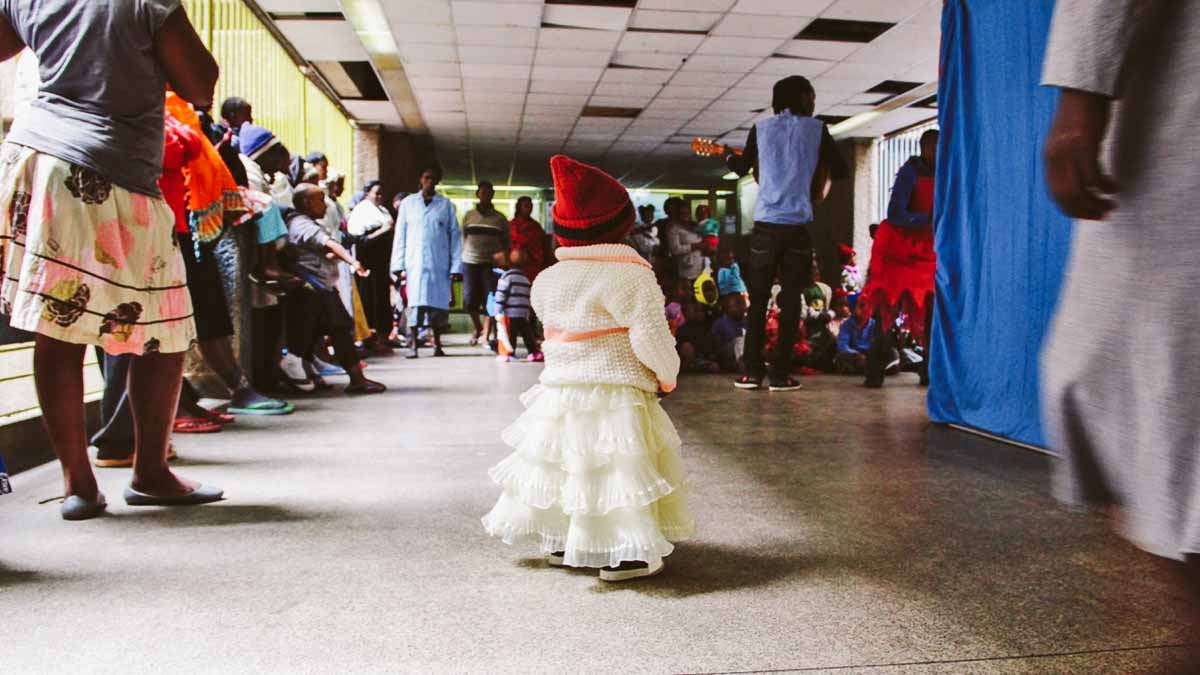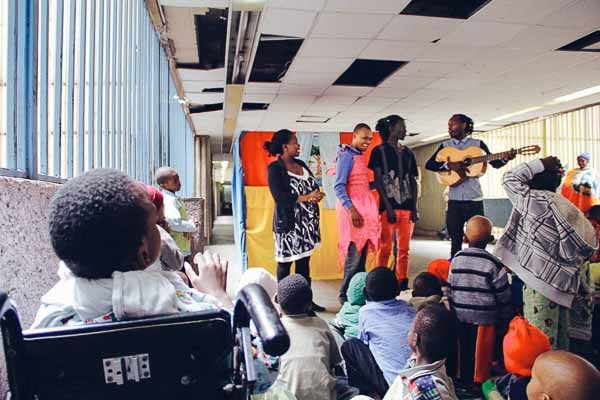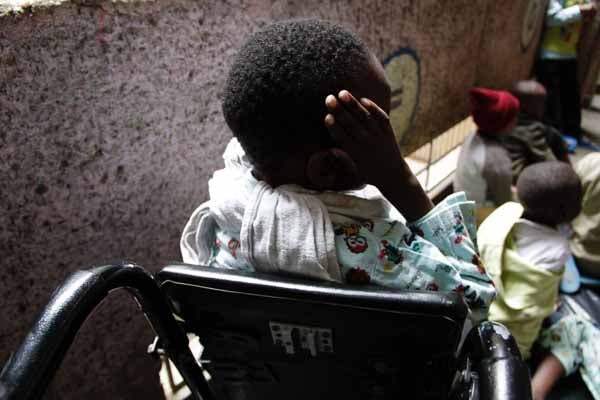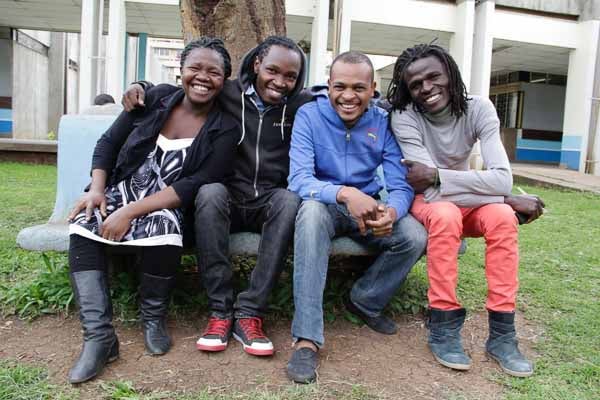Clowns are the saddest people of all: bringing smiles to a pediatric ward in Kenya
Listen
A small patient at a cancer ward in Kenya watches as clowns perform a sketch. (Brenna Daldorph/for WHYY)
It’s 10 a.m. on a chilly morning in Nairobi, the capital of Kenya, and the corridors of Kenyatta National Hospital are already bustling.
Loud giggles and shouts spill from the wide corridor opening onto the pediatric ward. That’s where Joel Kirambo, Kennedy Mukasa, and Joel Nzova are putting on a show for about three dozen kids and their parents.
The kids are all patients at the hospital. Most of them are battling serious illnesses — from complications related to cystic fibrosis to aggressive forms of cancer. But right now, all of that seems far away, because the kids are sitting on the floor, wiggling and giggling and having a blast.
The parents stand with their backs to the wall, their eyes flickering back and forth between the self-proclaimed “clowns” and their children.
The skit is spoken in Swahili, which is one of Kenya’s national languages. It is all about a man who doesn’t want to share food with his guests — but it’s clear that the storyline isn’t the most important part. What’s important is a chance for the three young performers to chase each other around.
The kids love it. Laughter rings in the halls.
Kirambo, Mukasa, and Nzova are performers who work for the Sarakasi Trust, a charity that has been providing “clown therapy” through its “Smiles for Change” project at Kenyatta National since 2008. Their performers don’t dress as clowns — they arrive in jeans and t-shirts and put together silly, slapstick skits to get the kids singing and laughing. It is the first and only group to offer such entertainment in a Kenyan hospital.
One young mother is attending the performance with her 3-year-old daughter, who has a tumor. She says her daughter always “feels down” after chemotherapy but that the skits motivate her.
 Lilian Konya, Joel Nzova, Kennedy Mukasa, and Joel Kirambo (with the guitar) sing for the children a silly song about different languages spoken in Kenya. The kids eagerly participate. (Brenna Daldorph/The Pulse)
Lilian Konya, Joel Nzova, Kennedy Mukasa, and Joel Kirambo (with the guitar) sing for the children a silly song about different languages spoken in Kenya. The kids eagerly participate. (Brenna Daldorph/The Pulse)
Joel Kirambo, one of the performers, agrees that he has seen the performances have positive effects on the children. Kirambo is a guitarist and often leads the musical parts of the skit. His clown name is “Kanono,” which means “big person.” Even his name is a joke, Kirambo is small and lithe.
When Kirambo first signed up to perform, he says he had no idea what to expect. “I used to have a perception that a hospital should be quiet and people should be serious,” he says. “You know, it’s all about syringes and needles and people in scary white coats.”
Initially, he thought it might be too intense for him.
“After my first day, I resigned,” he says. “I left the job. I only came back because I missed the group that I had been training with. I thought, if everyone else is doing it, I could do it as well.”
But while Kirambo says the kids warmed quickly to the clowns, another group in Kenyatta National Hospital was much more resistant.
“It took us about four years of coming in every day to get accepted by the doctors, nurses, and student doctors,” Kirambo said. “But clowning is really a serious job and it is something that really helps in a hospital.”
He says they now have a relationship with the doctors.
“We even put them part of our jokes sometimes. When they pass by, you just pass a joke to them and amazingly, they give it back!” Kirambo said.
He says that this kind of interaction acts as an icebreaker between the kids, parents, and medical practitioners. Recently, several doctors have asked the performers to accompany some of the children when they have to undergo treatment. Sometimes the children ask for the “clowns” themselves. Kirambo grew particularly close to one little girl with terminal cancer.
“One day, she asked me to record a song that she had written,” Kirambo says. “She only had one verse and it was very sad, because she was saying that it was her time to go. She sang and I had to accompany her.”
It really was her time to go. The next time that Kirambo returned to the hospital, he found out that she had passed away only a few hours before.
“It felt like she knew she was going to die and her song was very special to her,” he says.
 This young boy can’t help but dance as the performers sing. (Brenna Daldorph/The Pulse)
This young boy can’t help but dance as the performers sing. (Brenna Daldorph/The Pulse)
Kennedy Mukasa is another member of the clowning trio — the tallest. Like Kirambo, he too had to come to terms with the emotional burden of the work. He often thinks about a little boy who spent years at Kenyatta National Hospital while undergoing cancer treatment.
“There came a point when he wasn’t a kid anymore because he had stayed here for so long,” Mukasa said. “Even our jokes weren’t jokes anymore. You’d crack a joke with him but it would be the repetition of something you said last year or the year before.
“When that person goes away, in case of death, it’s affecting. That’s why sometimes you try to develop this hard shell, not to be easily cracked.”
Joel Nzova is the final member of the Sarakasi clowning trio and the one with the silliest role in the skit. Nzova dances around for the kids with a pink dress and wings stuffed over his hoodie and jeans. But even Nzova says that he finds it challenging to get going some days.
“It’s especially hard in the burns unit,” he says. “It is very scary. You can see their patients’ pain. When you come in as a clown and you discover that their bandages are being changed, which is very painful for them, it’s very challenging to start.”
In those difficult moments, Nzova says the biggest challenge is projecting positivity.
“These kids are very clever,” he says. “If you are down, they notice, and they’ll tell you. You have to have energy.”
But finding energy isn’t always easy. For that, Kirambo says the team relies on each other.
“We make a lot of jokes amongst ourselves,” Kirambo says. “We are very stupid people amongst us. But when you are tired or you are feeling down, it is a major booster. You just get a funny diss from your fellow and everybody laughs, and after five minutes you are ok, you are ready to work.”
There’s a saying that clowns are actually the saddest people of all. Nzova, Kirambo, and Mukasa agree.
“It’s true,” Mukasa says. “You make people happy, but, sometimes, you don’t have anyone to make you happy. Then you remember all the sick kids you’ve been clowning to, and … that’s a dark moment.”
“Most of the clowning, most of the smiling can never be true,” says Nzova. “Sometimes, you just smile so people can see you are smiling but maybe inside you are crying a lot.”
“It’s easier to make someone cry than to make someone laugh,” Kirambo says.
 Lilian Konya, Joel Kirambo, Joel Nzova, and Kennedy Mukasa, performers who work with the Sarakasi Trust to provide entertainment for children in the pediatric ward, pose in the courtyard of Kenyatta National Hospital. (Brenna Daldorph/The Pulse)
Lilian Konya, Joel Kirambo, Joel Nzova, and Kennedy Mukasa, performers who work with the Sarakasi Trust to provide entertainment for children in the pediatric ward, pose in the courtyard of Kenyatta National Hospital. (Brenna Daldorph/The Pulse)
However, the clowns agree that the work does bring moments of hope. Mukasa recalls a recent run-in on a matutu, one of the public buses that ferry people around in Nairobi.
“Someone tapped me on the shoulder,” he says. “It was a little girl. She introduced me to her father and told him that I used to entertain them in the hospital. It actually happens all the time. We run into kids in the outside world, and they say they remember us from the hospital. So that’s a happy moment. There are happy moments!”
Back in the hallway of ward 3, the kids, the parents, and a few nurses and doctors are still watching as the miserly host tries to keep the guests from finding his stash of food. Then, suddenly, there are screeches, laughs, and shouts. The crafty guest has finally stolen the hidden food.
There’s a chase scene, then the performance is over. Afterwards, the kids are quick to help Kirambo, Mukasa, and Nzova pack up their gear. There are some final fistbumps and high fives. Then parents take small hands and lead their sick children back to their hospital beds. Back to syringes and chemotherapy and poking and prodding and pain. But as they leave, the kids are still giggling, probably thinking about silly chase scenes and raucous singing, greedy hosts and sneaky guests.
Mukasa, Kirambo, and Nzova head out through the maze of hallways. When they get home, they might cry a little. If they need to. But next week, they’ll be back.
WHYY is your source for fact-based, in-depth journalism and information. As a nonprofit organization, we rely on financial support from readers like you. Please give today.



